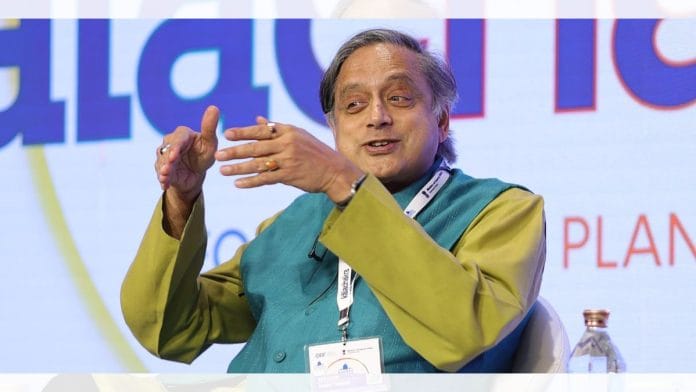New Delhi: India might be the only country that can balance Russia and Ukraine, said Congress MP Shashi Tharoor, before admitting that he now has “egg on his face” for being critical of India’s stance regarding Russia’s war in Ukraine.
Tharoor, speaking at a panel discussion on peacekeeping at the Raisina Dialogue, said that he’d accused the government of being silent on the war in 2022, even publicly criticising India for abstaining from a US-sponsored resolution that condemned in the strongest terms Russia’s action against Ukraine. But now, three years down the line, perhaps the strategy worked.
“I guess I have egg on my face now!” said Tharoor. He reminded the audience that he was in the Opposition and not in the government. “Only India has a prime minister who can hug the Presidents of Russia and Ukraine two weeks apart—few other countries can!”
The Raisina Dialogue has been organised by the Observer Research Foundation in partnership with the Ministry of External Affairs. The session, titled ‘Waging Peace: Looking Back to Look Ahead,’ saw the participation of former Mali PM Moussa Mara, former Canadian PM Stephen Harper, Norway’s Foreign Affairs Minister Espen Barth Eide, and Comfort Ero, the president and CEO of the International Crisis Group. It was moderated by British journalist Yalda Hakim.
The session was opened by Dag Nylander, director of the Norwegian Centre for Conflict Resolution, who set the scene with some guiding questions on how to lay the groundwork for successful peace efforts.
The rest of the session focused on how 2025 presents a potential inflection point—“an opportunity to steer the course towards peace,” as ORF described the session.
Also Read: As Raisina Dialogue kicks off, Jaishankar says no place for old assumptions in changing world order
A new world order
The panel, on what modern peacekeeping efforts can learn from the past, acknowledged that the world order has changed, but disagreed on what needs to be done about it.
“The rules-based order, as we’ve known it, is ending,” said Harper. “I think it was the aberration—big power dynamics and spheres of influence determining peace and war is the norm of history, and I think we’re returning to that.”
Adding that the US was the originator of this post-world order, but is now abandoning that post, the former Canadian PM said, “It doesn’t make peace processes irrelevant, it just depends on the context of the bigger power,” he said. Major powers will no longer be constrained by rules.
.@ShashiTharoor: The rules-based order was shaped by a few. #Inequality isn’t new—permanent members have long violated rules. Today’s challenges are no different, and the system remains salvageable.#Raisina2025 #RaisinaDialogue2025
— Raisina Dialogue (@raisinadialogue) March 18, 2025
He also said that Canada now needs to plan and “take some hard positions vis-à-vis the US,” instead of just “shooting insults back”, which he called counterproductive.
Norwegian foreign minister Eide said that while Norway has played a role in peace processes across the world, it can’t take this role when it comes to Ukraine. [WHY] Agreeing with the analysis that this world is now being run by “big powers” he said that there’s still scope to reform the world order.
“The rules-based order is only over if we want it to be over,” he said.
Mara—whose country has seen conflict for decades—said that peacekeeping is hard when there are vested interests that feel peace can sometimes be more expensive than the status quo.
“The most important thing is the political will for peace. The military is more focused on victory than settling for peace. Social processes are also important, as is the regional environment,” the former Malian PM said, referring to the conflicts in Burkina Faso and Niger.
Ero disagreed with the politicians, saying that the world is currently in an era where wars are rising, but, more critically, the institutions that would normally manage such situations are no longer the first port of call.
“We need to think about what we cherish and can carry from the old world to the new world—the thing I’d like to cling to is safeguarding the fundamentals of nonaggression.”
Tharoor, meanwhile, spoke of India’s historical role in peacekeeping.
“India’s got a quarter of a million peacekeepers across the world. This is a country with an extensive record of sending peacekeepers across the world in order to serve the cause of peace,” he said.
(Edited by Sanya Mathur)
Watch CutTheClutter: Modi’s China comments & what comes after border disengagement







That is being a little disingenuous. Guided purely by national interest, India has been in Russia’s corner for the last three years.
Tharoor is such an asset for the nation. Always open minded and progressive in his thoughts.
If only the Congress knew how to harness his intellect and oratory for the benefit of the party!